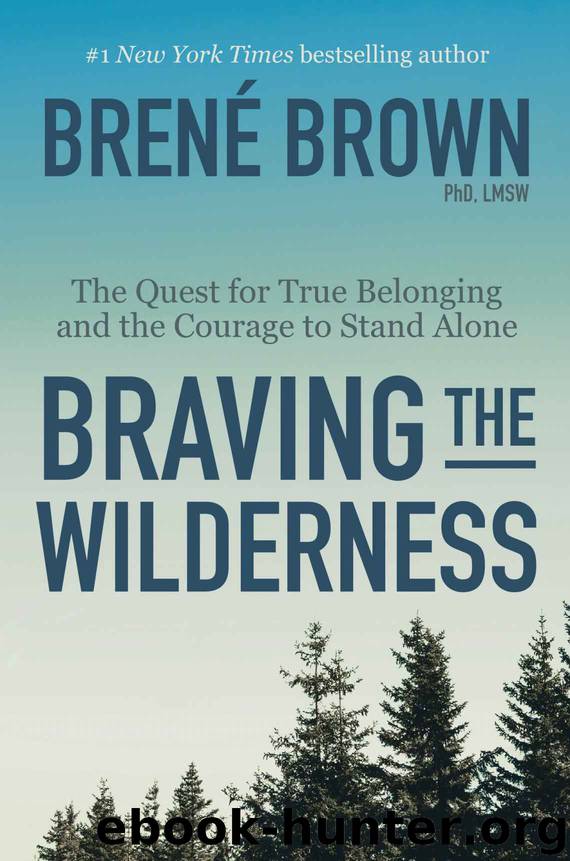Braving the Wilderness: The Quest for True Belonging and the Courage to Stand Alone by Brené Brown

Author:Brené Brown [Brown, Brené]
Language: eng
Format: azw3, epub
ISBN: 9780812995848
Publisher: Random House Publishing Group
Published: 2017-09-11T16:00:00+00:00
IF YOU’RE NOT WITH ME, THEN YOU’RE MY ENEMY
As I briefly touched on earlier, one of the biggest drivers of the sorting that’s happening today is the proliferation of the belief that “you’re either with us or you’re against us.” It’s an emotional line that we hear everyone, from politicians to movie heroes and villains, invoke on a regular basis. It’s one of the most effective political sorters, and 95 percent of the time it’s an emotional and passionate rendering of bullshit. Well intentioned or not.
Benito Mussolini relied heavily on the line “O con noi o contro di noi” (“You’re either with us or against us”). In the weeks following 9/11, both George W. Bush and Hillary Clinton told the world’s citizens that they were either with us in the fight against terrorism or against us. Bush took it even further by saying, “Every nation, in every region, now has a decision to make. Either you are with us, or you are with the terrorists.” And it’s in our stories, too. In Star Wars: Revenge of the Sith, Darth Vader says to Obi-Wan Kenobi, “If you’re not with me, then you’re my enemy.”
Normally, we use the “with me or against me” during times of significant emotional stress. Our intentions may not be to manipulate, but to force the point that we’re in a situation where neutrality is dangerous. I actually agree with this point. One of my live-by quotes is from Elie Wiesel. “We must always take sides. Neutrality helps the oppressor, never the victim. Silence encourages the tormentor, never the tormented.” The problem is that the emotional plea is often not based in facts, and preys on our fears of not belonging or being seen as wrong or part of the problem. We need to question how the sides are defined. Are these really the only two options? Is this the accurate framing for this debate or is this bullshit?
In philosophy, “you’re either with us or against us” is considered a false dichotomy or a false dilemma. It’s a move to force people to take sides. If other alternatives exist (and they almost always do), then that statement is factually wrong. It’s turning an emotion-driven approach into weaponized belonging. And it always benefits the person throwing down the gauntlet and brandishing those forced, false choices.
The ability to think past either/or situations is the foundation of critical thinking, but still, it requires courage. Getting curious and asking questions happens outside our bunkers of certainty. For most of us, even if the “with us or against us” mandate sounds a little like oversimplified BS, it still feels easier and safer to pick a side. The argument is set up in a way that there’s only one real option. If we stay quiet we’re automatically demonized as “the other.”
The only true option is to refuse to accept the terms of the argument by challenging the framing of the debate. But make no mistake; this is opting for the wilderness. Why? Because the
Download
Braving the Wilderness: The Quest for True Belonging and the Courage to Stand Alone by Brené Brown.epub
This site does not store any files on its server. We only index and link to content provided by other sites. Please contact the content providers to delete copyright contents if any and email us, we'll remove relevant links or contents immediately.
Rewire Your Anxious Brain by Catherine M. Pittman(17589)
Talking to Strangers by Malcolm Gladwell(11875)
The Art of Thinking Clearly by Rolf Dobelli(8841)
Mindhunter: Inside the FBI's Elite Serial Crime Unit by John E. Douglas & Mark Olshaker(7833)
Becoming Supernatural by Dr. Joe Dispenza(7104)
Change Your Questions, Change Your Life by Marilee Adams(6640)
Nudge - Improving Decisions about Health, Wealth, and Happiness by Thaler Sunstein(6633)
The Road Less Traveled by M. Scott Peck(6633)
The Lost Art of Listening by Michael P. Nichols(6472)
Enlightenment Now: The Case for Reason, Science, Humanism, and Progress by Steven Pinker(6405)
Win Bigly by Scott Adams(6310)
Mastermind: How to Think Like Sherlock Holmes by Maria Konnikova(6234)
The Way of Zen by Alan W. Watts(5798)
Daring Greatly by Brene Brown(5639)
Grit by Angela Duckworth(4735)
Big Magic: Creative Living Beyond Fear by Elizabeth Gilbert(4723)
Men In Love by Nancy Friday(4320)
Flow by Mihaly Csikszentmihalyi(4052)
The Four Tendencies by Gretchen Rubin(4024)
